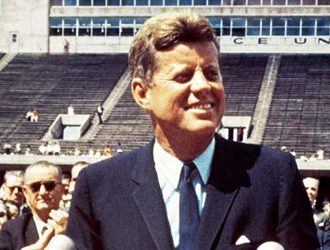JFK, 50 years later

President John F. Kennedy makes his "moon speech" at Rice University in Houston on Sept. 12, 1962, to whip up support for NASA's fledgling Apollo program and lay out why he believed sending astronauts to the moon by the end of the 1960s was so important. (Photo from NASA)
Kennedy was in office for just more than 1,000 days, but he made a dramatic impact, bringing a new style to the presidency. His stirring inaugural speech, his pledge to land on the moon and his handling of the Cuban missile crisis all contributed to his popularity. But internationally, communists advanced in Southeast Asia, to which Kennedy responded by sending in military advisers and troops. And domestically, Kennedy's civil rights initiatives floundered.
“LBJ and [Kennedy's widow] Jackie K teamed up to promote the image of Kennedy as a martyr for civil rights and other elements of the late president's then-stalled legislative agenda,” Langston says. “The result included the 1964 Civil Rights Act.”
What issues are still up for debate among presidential scholars and historians?
“There is still debate over whether JFK was heading in the direction of pulling US troops out of Vietnam when he was killed,” says Langston. “In popular culture, the 'Kennedy as secret dove' line is taken to a crazed extreme by people like Oliver Stone.”
Also, says Langston, it's fair to question the extent of JFK's general influence on popular culture had he served his full term.
“If Kennedy had remained in office for either a full four or eight years,” says Langston, “his place as a cultural icon would surely have been diminished by the force of events.”
